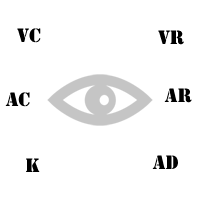Online NLP Tutorial.
- Introduction to NLP (Neuro Linguistic Programming).
- Mental Manipulation.
Introduction to NLP.
We - people - are strange creatures. We learned how the electricity works and we don't think it is magic anymore. And we learned how the solar system works and we know now that the Earth is orbiting the Sun and not the other way around. And we learned many other things, too.
And yet our mind remains a mystery for the most of us. We just have feelings - for no particular reasons. We just have skills and limitations. It happens to us and we have no control over it.
Or have we gave up this control? Is it possible for us to DECIDE what to feel and how to behave rather than to react to external events. Can you be in control of your life?
And why is that we have so much problems communicating our point of view to others? Can we learn THEIR language and make sure they LISTEN when we talk?
And why some people have allergies and others don't?
In the NLP Tutorial book you will find some answers. And techniques. And you will learn to create techniques of your own. And to manipulate yourself and to persuade others. And more - as this journey never ends.

There are plenty of NLP books out there. What makes this one different? I believe that it is the approach. I don't want to be told what to do - I want to understand how those techniques were created. I don't want to be a student. How to become a master?
This book will teach you to look at the world from the NLP point of view. Unlike some (not all, don't take me wrong - some) other books that you can read, close and forget. After you finish this one you will suddenly begin to notice things about yourself and people around you, that you never noticed before. A new perspective, a new chance to see it right.
NLP now became part of our life. It is used in clinics - usually in a very strange way. It is used in the commercials. And in the election campaigns. And on the street - in the book you will find some very non-traditional examples.
Can you use NLP to make your children to go to sleep? Will it work on a job interview? Can you seduce someone - or can someone seduce you - using these techniques?
And what about goals in your life? Can you set them in such a way that they are achievable and fun to achieve? And what if you don't believe that you can achieve them? Can you get rid of this limiting believe using NLP and to believe in something useful instead?
What I am going to do today is just a little introduction to NLP. It will give you a good idea of what the Neuro Linguistic Programming is in general (for details, see nlp books and articles on this site) . And when you are done with this text you will have enough to begin applying these techniques and you will also know where to go next and what to expect.
Lets start with a little demonstration here. I am going to say something, and you just listen. Ready? Darwin Award... OK, some people smiled. What happened? What happened is that the name worked like a key to some memories, not even memories - but the state of mind associated with these memories. In NLP it is called an anchor. Now, how can we use it?
Well, the Darwin Award anchor by itself is not a very useful tool. But lets first understand how it works. First we need to know what we want. We want to bring a person to some state of mind. Then we look in person's past - was there something like what we are trying to do? Then we look for an anchor: in our case it was the name - Darwin Award.
So lets take a more realistic example. You are going through the job interview. And of course you want the employer to like you. Can you say "Darwin Award"? Probably not. But what you can do is to create an anchor on the spot. Say, every time the employer smiles, you do something like that (touching the wrist). This gesture is very covert, it is hard to catch. But soon enough - if you do it right as there are important little details here - soon enough the employer will begin feeling better when you do it. And then you look at him... or her for that matter... and you say something like "so what do you think about me working for you (gesture)..."
I would say this one trick alone if done properly, will almost double your
chances. How can it not - if when he thinks about you working for him (gesture)
he'll just FEEL SO GOOD!

You all probably know about the Pavlov's dog. The dog that was conditioned to salivate whenever the bell rings. What most people don't realize is that we are like this dog too. OK, not all of us but all men are dogs, how about that? And when we create a link between the stimulus (a bell) and a response (salivation) - it is no different from when we create a link between our competitor on the business negotiations and a sense of disgust and frustration.
How do we do that? There are few techniques. For example: I can stay here when I talk about happy children in Canada during Christmas and there when I talk about unhappy children in Somali and here again when I talk about myself and there when I talk about my competitor. The place becomes what is called a spacial anchor.
Now, in the NLP Tutorial I will show how to combine techniques and how to apply them sequentially and how to make them work even when you are not there anymore. Because when you leave - the anchor you created stays.
OK. So what is NLP? The abbreviation - and a discipline - was created by John Grinder and Richard Bandler and it stands for the Neuro Linguistic Programming. Which is just another way of saying "programming people's mind using words". It was first created as a tool of mental manipulation but then people came to REALIZE that we can also use it to manipulate ourselves and... Well, I'll talk about it later.
Now, there is a price to pay when you learn NLP or anything like that. You see, when I say something that is not entirely true - it is called a lie, I mean in the real life. Not in NLP, not in psychology. Here it is called a therapeutic metaphor. Which is fine but at some point people just lose track of what is said to motivate them and what is said to educate them. Can you heal cancer using words? How the hell would I know? But I sure heard a lot of stories...
So lets come to a nice agreement, ok? I will keep those fairy tales to a minimum. I am not saying that you cannot heal (because you probably can, especially using the State of Power techniques) or that you cannot do some other miracle things but I will not tell you anything that I was not witnessing myself. Unless. Unless I tell you that it is not my experience, kind of a fair warning.
I remember being at two Hypnosis seminars, both in the same city and there were two different teachers. And they both told us the same story. Nothing special about it, but both times the story begins with words "one of my patients". It was fun.
So what can you expect from NLP? You can use it to affect people's behavior and to change their state of mind. Then you can deal with phobias - what takes 6 to 12 month of traditional psychotherapy - will take 5-10 minutes in NLP, see the Free NLP E.mail course for details. You can use it to set and achieve goals. How about this goal - in 5 years I want to have a million dollars? Not guaranteed but quite possible, but I never witnessed it (gesture). And you can deal with traumas.
Now, traumas are important. Say, when you were a child you saw a cat smashed by a car. And it was overwhelming. Now your unconscious mind - by the way, in NLP you are going to hear these words a lot - unconscious mind is protecting you. How? It locks the memory so that you don't remember. And you don't. Just from time to time it might - or might not - present the memory - or whatever is left of it - to your conscious mind for reevaluation. That's when people start screaming, going into depressions and so on. And unconscious mind says "OOPS! I better do it later". And it does it again later.
Now, in addition to screaming and depressions there is one more unpleasant thing here. Keeping negative memory suppressed takes energy. Your energy.
So using NLP to find and discharge these so called "negative blocks" can be very helpful. I remember when I was learning NLP, my teacher did a technique on me - one of the techniques from so-called NLP New Code (see books by Robert Dilts). It was the last thing for the day, class was over, so I said good bye and left. And then as I was walking towards my car I have noticed that I am a little bit jumping, you know. And laughing. And singing. Which is like totally not my style of walking, by the way. And for the next 30 minutes I felt better than ever in my life and I mean it. I - see, I am still smiling when I think about it.
I still have no idea by the way, what block have I lost that day but sometimes people do remember and sometimes it is not pleasant at all, especially when it was not done properly. I remember having a client long time ago... Well, it seems like a long time. I was a beginner and I made all mistakes I could. He had a minor problem and I did what is called a Time Line - a very powerful tool for working with someone's (or your own) past and future (see NLP Tutorial for more details on Time Line Therapy or find the book "TLT and the basis of personality by T.James and W. Woodsmall). Remember the goal of having a million dollars? That's how I would do it - using the Time Line. So I made couple of mistakes and suddenly a client's suppressed memory aroused. Just imagine: the guy had a nice life, he was in good relations with his family... All he wanted was to quit smoking. Which I believe he did, but as an unexpected extra bonus he remembered that - you see, he had a brother who died when he was a kid. An accident, as he thought. And now he remembers that this little boy was killed in front of him by his own uncle.
Now I was lucky this guy didn't run away screaming. Because - because as we went through the technique further - we discovered that the uncle was present - yes, but he was sleeping in the chair. And the boy was killed - yes, but in some stupid movie that the child was watching because the uncle was asleep and didn't interfere. Can you imagine? And then his brother died, two memories combined and he got a powerful negative block. So it is a lot of fun, as I mentioned.
That's why I would rather use one of State of Power techniques (see the Introduction to State of Power) for negative blocks, as they do not bring memories up, they are just discharging them.
By the way, I have just made this story up. Now, let me tell you why. Remember
the fairy tales that people tell in classes like that? Now THIS story is a good
example of how the fairy tale can be created. Because it is quite good - it
really describes how the negative block and a false memory can
be created. So if you want you can use it in YOUR classes when you graduate and
begin to teach NLP. And then few years later I will enjoy when someone
tells ME about one of HIS clients that saw his uncle killing his brother.
I really enjoy it.

Now this is a borderline between NLP and memetics (see "Virus of mind" book). It is a theory of how to create or delete self-propagating stories or ideas, also known as mind viruses. If you want to create your own cult for example, you should study memetics.
A little bit more about basics of NLP. When people talk, about 7 percent of information is words, the rest comes through gestures, mimics, voice tonality and so on. By the way, I am not sure why it is 7 percent and not 8.35, so lets just take it for granted. Now, lets say I talk to someone. And when talking, I assume exactly the same posture, just reversed, so I reflect him as the mirror. Consciously it will probably go unnoticed. But the unconscious mind notices such things. And unconscious mind will think - hey, this guy is like me!
Then I begin to breath at the same pace and person's unconscious mind will say again - he is EXACTLY like me! I like him! Then I will blink at the same time as you do and will do same gestures... Now, I don't have do it exactly the same way. Say, I can move my foot at same speed as you move your hand, it still counts. And then I start talking using your language.
Different people use different words. I can say about sound idea that I have heard. In this phrase I used a lot of auditorial words, or also they are called auditorial predicates. Same thing using visual predicates - I was shown a brilliant idea. Using kinestetic predicates, ones that describe feelings, it would be something like - I got a grasp on a solid idea that feels right.
So what can we do with this staff? Well, as I said - different people use different words. So you need to notice them and to speak to people using their predicates. How many times you saw that two people have an argument and one says: I don't SEE you point! And another replies: Because you are not LISTENING! Well, they speak different languages.
So lets say in addition to mirroring person's postures and gestures, I use his words. His set of predicates. The unconscious mind of this person will think "hey, he moves like me, he is breathing like me, he is talking like me - he IS me". And that's the borderline between NLP and Hypnosis, as when the person's unconscious mind gets confused just who is who here - it drops the guard and whatever you say - gets accepted with minimum - if any - verification.
In the Introduction to Hypnosis I am going to teach it in details, but the point is - when you move from mirroring to leading - you can lead the person pretty much anywhere.
What else? Eye signals. It is not something NLP invented, it was around for ages. Remember people saying "look in my eyes, you liar"? Or else - why would drug traders wear dark glasses? May be because they know that there are certain eye movements that a person cannot control? Or maybe it is a fashion statement? Or maybe - remember Memetics - maybe those who didn't wear dark glasses were wiped out by competition, because they had a disadvantage during negotiations?
I'll talk about it in details in the NLP Tutorial, but lets just do it briefly. As you all know, the left brain hemisphere is responsible for logic and right brain hemisphere is responsible for emotions. Mostly so, because they can help each other and I am not going to talk about left-handed people here. But the interesting thing is - when we think using left brain - we look right. Yes, we just move our eyes. And when we think that we are using right brain, our eyes are moving left. So can we read people's mind?
There is more in it. When we think about images - we look up and sounds are in the mid-level (where the ear is) and feelings are kind of here, down-right. If you look at the person, here is the picture for eye movements:

Here V stands for Visual, A - for Auditorial, K for Kinestetic, Ad for Auditory Digital, same as logical thinking, c for constructed, and r for remembered.
Now, say you ask person a question and the eyes move like that: Vr - Vc - Ad and then he answers? What does it mean? Probably he remembered something, then he constructed something and then he presented you with construction, carefully controlling his words. In other words, now you have a lie detector. But as I said, there are left-handed people, people who were forced to be right-handed in school, ambidexters and so on, so be careful. They might have reversed or partially reversed eye signals.
That was about the low level NLP, so to speak. There is a high-level one that deals with people's strategies and believes. Because you see, I can do tons of NLP and Hypnosis on you, trying in vain to convince you to STOP SMOKING, but if you talk about yourself and you say "I am a smoker"... Nope. As long as you have this believe, we are not going anywhere. Fortunately there are techniques that would help to move this believe from the place where you keep things you believe in, to the place where you keep things you used to believe.
Can you give me an example of some very powerful believe that you had and don't have anymore? How about Santa? How about "it's 20th century"? If you can do it with one believe - you can do it with any believe. They all work same way.
How about "I used to smoke"? How about "I am going to make a million dollars in five years"? (Now, as I mentioned - I saw people that quit smoking, but I only read about them making million dollars ;)
The State of Power techniques work with beliefs a lot. Not only they are designed to wipe out the negative and limiting beliefs, but they are also educating your unconscious mind. Educating how to deal with beliefs when you bump into one, so that your unconscious mind can do it automatically as you go, without the need for you to stop and remember the technique (see Introduction to State of Power). In the end of this article (not THIS one but the Introduction to State of Power) I will present a little hypnotic script from my State of Power collection, that lets you feel what it is like. It does require few days of practice to get maximum of the Power techniques, but this script will at least give you an idea.
Speaking of time - Do you remember when you were seven? Remember? Now, notice where this memory came from and do not look at others, as it is very individual thing. Point your finger there. Remember when you were twenty? Point your finger. Remember when you were forty? Who cares how old you are? Point your finger to the memory of the future, if it is your future. Do you realize that they are all lined up? And there is a very powerful set of techniques called Time Line Therapy, that can actually work with the way you keep your memories.
Do not do it by yourself please, until you read the book by Tad James as it WILL change your personality. It is unbelievable. Also it is a good way to program your future that I will teach in the NLP Tutorial.
Now, lets take a break and then we will talk about Hypnosis.